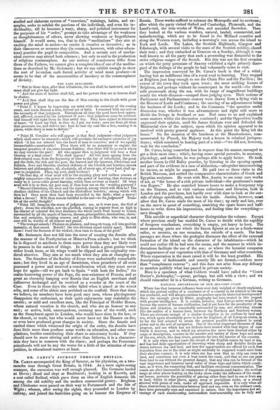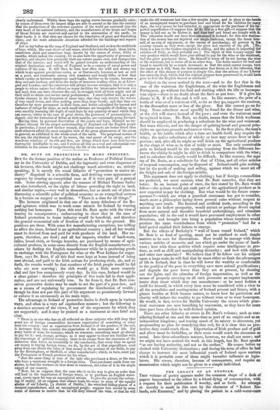DR. CARUS'S JOURNEY THROUGH BRITAIN.
Da. CARUS accompanied the King of Saxony, as his physician, on a two- months tour through Great Britain, in 1844. As a mere sight-seeing scamper, the excursion was well enough planned. The Germans landed at Dover ; dined and slept at Buckhurst; looking in at Knowle, and a seat called Redleaf, which gave them an idea of English domestic life among the old nobility and the modern commercial gentry. Brighton and Chichester were passed on their way to Portsmouth and the Isle of Wight ; whence, after seeing the sights, they proceeded to London by railway, and joined the festivities going on to honour the Emperor of
Russia. Three weeks sufficed to exhaust the Metropolis and its environs; after which the party visited Oxford and Cambridge, Plymouth, and the Land's-end, the iron-works of Wales, and ascended Snowdon. Then they looked at the various wonders, natural, landed, commercial, and manufacturing, which are to be found in the Midland counties and along the Western coast, including a morning's run across the island to York and Leeds. The Lakes, the Scottish Highlands, Glasgow and Edinburgh, with several visits to the seats of the Scottish nobility, closed their tour ; and they embarked at Granton on a Sunday, although it was well known to all the party that such a proceeding was distasteful to the strict religious usages of the Scotch. But this was not the first occasion on which the petty potentate of Saxony exhibited a right princely disre- gard of the feelings of the people lie had voluntarily come to visit. The impression conveyed by Dr. Carus's book is that of a whirl; leaving but an indifferent idea of a royal road to learning. They stopped at Brighton just long enough to see the Chain Pier and the Pavilion ; the extent of the town they took upon trust ; the most striking feature of Brighton, and perhaps without its counterpart in the world—the three- mile promenade along the sea, with its range of magnificent buildings nearly the whole distance—escaped these judging eyes. Their notions of Parliament and Parliamentary oratory were drawn from a flying visit to the Houses of Lords and Commons ; the moving of an adjournment being the business of the Lords; and in the Commons " the question under discussion was, whether it was advantageous and right still more to divide the livings in Scotland or not. Peel came to us and explained some matters whilst the discussion continued ; and the Opposition loudly expressed their opinion, until Sir James Graham rose and defended the Ministerial view of the subject, upon which his opinion appeared to be received with pretty general applause. At this point the King left the house." On the occasion of the luncheon at the Mansionhouse, com- memorated by Punch, his Majesty took a lesson in criminal jurispru- dence; which consisted in hearing part of a trial—" we did not, however, wait for the conclusion."
Dr. Carus, being somewhat less in request than his master, managed to get a little more time ; which, having some special pursuits, in anatomy, physiology, and medicine, he was perhaps able to apply better. He took another lesson in Old Bailey practice, by listening to the opening speech and part of the evidence in a case of abduction,—altogether misconceiving its nature, as might be supposed. He paid two or three visits to the British Museum, and settled the comparative characteristics of Greek and Egyptian sculpture. He went with Mrs. Austin to see some rare works of art, at "the house of a rich private individual—the gentleman's name was Rogers." He also snatched leisure hours to make a fourpenny trip. on the Thames, and to visit various collections and libraries, both in London and the provinces, but hardly ever with time to look at the out- side of things specifically, much less the inside. Justice, however, must allow that Dr. Carus made the most of his time ; up early and late, ever on the move in quest of something, snatching the spare hours and half- hours to write down his impressions, and finding time for everything— save thought.
This outside or superficial character distinguishes the volume. Except where previous study has enabled Dr. Carus to decide with the rapidity of foregone conclusions, everything is empty, yet heavy to boot. The most amusing parts are where the Saxon figures at sea as a fresh-water sailor, or mounts, on one occasion, the outside of a coach. The best passages are those where the geologist discusses the effect of the external formation of the island on the character of its inhabitants—which he could not realize till he had seen the ocean, and the manner in which in- dentations facilitate the use of the sea; or where the botanist compares the appearance of our vegetation with that of Germany and other countries. Where expectation is the most raised it will be the least gratified. His descriptions of fashionable and courtly life are formal,—seldom more than "complement externe" ; and this does not arise from any delicacy to mention publicly what has passed in private society.
Here is a specimen of what Cobbett would have called the "Court Doctor's feelosophy,"—prosy, perhaps, but still with a view; and we should remember he is a German, writing to Germans.
NATURAL ADVANTAGES OF OUR SEA-GIRT COAST.
Where has that immense influence been ever duly weighed or clearly explained,- which the general outline of a continent or of a country in its relation to the sea has produced, and will always continue to produce upon its historical development? Since the example given 13y Ritter, geography has been treated in this respect with greater intelligence. It is certain, however, that Europe never would have become the centre of human civilization, had it not been for the peculiarity of its figure and situation, so remarkably surrounded by seas, and stretching almost like the outline of a human form, between the Northern and Southern waters. There are elements enough of a similar description in its outlines by land and sea, which again abundantly prove in how far England, of all European states, is by far the best adapted to attain the greatest possible development in naval power and in the arts of navigation. One of the most important elements of this progress, and one which has not hitherto been treated with that degree of care which it deserves, and to which my attention has never been directed either by maps or descriptions, consists in the number and variety of those bays and arms of the sea, which, like deep rivers, penetrate far into the interior of the country. It is only when one has made the circuit of the English coasts by land or sea, and has had daily opportunities of observing what sharp and decisive limits are drawn between sea and land, and how few opportunities are offered for such free transition from one to the other as might naturally be supposed would exist from their absolute contact; it is only when one has seen that no ship can come to land, and sometimes not even a boat touch the coast, and that no one can pass from land to sea without the greatest danger, that any idea can be formed of the vast importance and immense naval value of those bays and inlets which consti- tute, as it were, the connecting link, and facilitate reciprocal communication. The coasts are often inaccessible in consequence of dangerous sand-banks; the restless surge at other places beating on the rocky shore under the influence of the small- est breeze, prevents the possibility of passing either from land to sea or from SOS to land, whilst in other places, again, steep or precipitous rocks, or a strand strewed with pieces of rock, make all approach impossible. It is only when all these obstructions to intercourse between laud and sea, even on the ordinary coast, have been personally seen and examined in nature, that the importance and ad- vantage of such ameliorating, intermediate inatrumentality can be fully and clearly understood. Within these bays the raging waves become gradually calm; by means of them even the largest ships are able to ascend so far into the country that the productions of the remotest quarters of the world are conveyed into the very heart of the national industry, and the manufactures of the looms and forges of Great Britain are received and carried to the extremities of the earth; on their banks it is that sites are chosen for the foundation of great and flourishing cities,and the most admirable situations afforded for the buildings and repairs of snips. Let us lay before ns•the map of England and Scotland, and reckon the multitude of bays, which, like vast rivers of salt water, stretch far into the land; these inlets, sometimes short and sometimes long, known by the names of rivers, friths or mouths, which indent the country: let us also have the opportunity of personal in- spection, and observe how gradually their sea nature passes over, and changes into that of the interior; and much will be gained towards an understanding of the original destination and calling of England to be a country of naval power and mistress of the seas. It will then be seen how often the wild and stormy sea which beats against precipitous rocks, as at Dartmouth, becomes at last as still U a pond, and terminates among neh meadows and woody hills; or bow that which rushes on between dangerous sand-banks, further on its course, becomes a deep and safe harbour, and laves the docks of immense trading cities, as at Liver- pool and London; and the conviction will always become stronger, that it is only a people to whom nature had offered so'many facilities for intercourse between sea and land, that can have obtained the call, to struggle with all their might and all their skill to obtain and secure naval preeminence. I must further add, as a par- ticular element in the formation of these bays, that they only receive the waters of very small rivers, and often nothing more than large brooks, and that they are therefore far more permanent in their form, and better calculated for havens and harbours of refuge for ships, as such small streams are incapable of choking up or oven sensibly lessening the depth of such bays by any quantity of sand which they can convey, whilst in the case of great rivers, the processes cf accumulation, of deposit, and the formation of deltas at their mouths, are continually going forward. Having thus, by personal observation of the coasts and bays, obtained an im- portant element for the proper understanding of England and the English people in particular, I must now further remark, that these coasts are better fitted than most others to afford the most complete view of the great phienomena of the ocean in general, as exhibited in the whole crust of the earth. The perpetual motion of the sea, the rhythmical beat of its waves, the vast power of its surge, and the wondrous relations of its ebb and flow, are things which have here first become thoroughly intelligible to me, and I reckon all this as a real and substantial con- tribution to the means of comprehending the life of the earth in general.



























 Previous page
Previous page